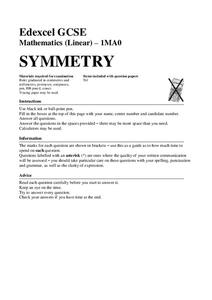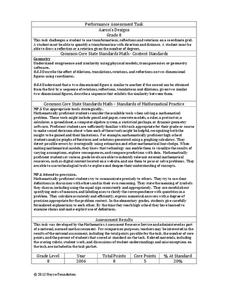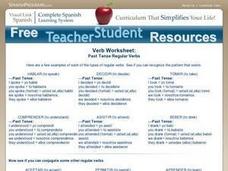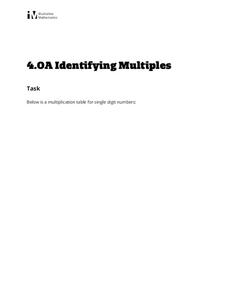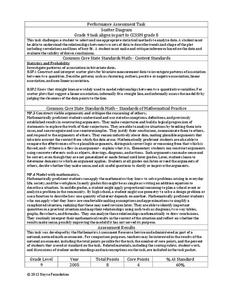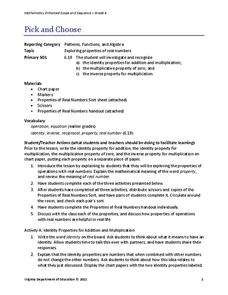Mathed Up!
Symmetry
Eleven problems provide pupils the opportunity to find the lines of symmetry or identify rotational symmetry. Scholars alter designs to make them symmetrical, learn to recognize signs that are symmetrical, and identify the type of...
Curated OER
Complete the Patterns
In this patterns worksheet, learners look at the each of the patterns in the 5 rows of shapes. In each row, students recognize patterns by filling in the last 2 shapes to complete the pattern in each of the 5 rows.
Curated OER
Pencil It In
In this recognizing patterns learning exercise, students identify problems with patterns and draw the number of pencils that most likely come next. Students solve four problems.
Curated OER
Shape Sort
Sorting is a great way to familiarize learners with basic shapes in this partner activity. Pairs have sixteen shape cards with various sizes and types of triangles, rectangles, hexagons, and squares. They have four category cards in...
Curated OER
Writing Correct Number
In this math practice learning exercise, learners solve 6 problems that require them to recognize numbers and count pictures objects.
Curated OER
Calculator Patterns 1
For this recognizing patterns using a calculator worksheet, students find recurring decimals to fill in the missing numbers. Students solve 8 problems.
Curated OER
Mix Patterns Worksheet
In this number recognition worksheet, students recognize patterns in numbers. Students are given four or five numbers for each of the twenty problems and are to determine the next number by figuring out the pattern.
Inside Mathematics
Aaron's Designs
Working with transformations allows the class to take a turn for the better. The short assessment has class members perform transformations on the coordinate plane. The translations, reflections, and rotations create pattern designs on...
West Contra Costa Unified School District
The Power of Ten: Building a Magnitude Model
Add visual representation to teaching place value with a magnitude model. Using adding machine tape, pupils build a linear place value strip from 1 to 100.
Curated OER
Sentence Patterns II: Locating Objects and Complements
What sets this worksheet apart are the clear, concise explanations for some rather complex grammatical terms. Object complements, subject complements, transitive and intransitive verbs, and direct and indirect objects are all carefully...
Curated OER
Conjugating Verbs in the Past Tense
This worksheet has pupils study the examples, identify patterns, and apply those patterns to new problems. The goal is to recognize and understand how to put regular Spanish verbs in the past tense. There are six completed examples; two...
Curated OER
Repeat It challenge
In this recognizing pattern learning exercise, students observe sets of patterns, identify the patterns that repeat, and choose the picture that most likely comes next. Students solve five problems.
Curated OER
Incomplete Dominant and Codominant Traits Worksheet
A two-page instructional activity provides seven Punnett squares for practice in determining genotypes and phenotypes. Each is an example of incomplete dominance or codominance. After your bright biologists have mastered Punnett squares,...
Curated OER
Writing Numbers
How many letters? Budding counters determine and record the number of letters in five messages trailing behind planes. The write down both the numeral and the word form; the highest number here is 19. Next, pupils fill in two blank...
Center for Learning in Action
Investigating Physical and Chemical Changes
Super scientists visit ten stations to predict, observe, and draw conclusions about the physical and chemical changes that occur when different states of matter—liquid, solid, and gas—are placed under a variety of conditions. To...
Illustrative Mathematics
Identifying Multiples
Administer an activity that fosters a child's understanding of multiples. Young mathematicians are guided to complete three tasks on a multiplication chart. Once they color the boxes with multiples of two, three, and four, learners...
Inside Mathematics
Scatter Diagram
It is positive that how one performs on the first test relates to their performance on the second test. The three-question assessment has class members read and analyze a scatter plot of test scores. They must determine whether...
Noyce Foundation
Boxes
Teach your class to think outside the box. Scholars use the concept of equality to solve a problem in the assessment task. They determine how to use a scale to identify the one box out of a set of nine boxes that is heavier than the others.
Inside Mathematics
Graphs (2006)
When told to describe a line, do your pupils list its color, length, and which side is high or low? Use a worksheet that engages scholars to properly label line graphs. It then requests two applied reasoning answers.
Virginia Department of Education
Pick and Choose
Properly teach properties with three activities that allow learners to investigate properties of real numbers. The resource covers the identity properties for addition and multiplication, the inverse property for multiplication, and the...
California Education Partners
Science Fair Project
Plant the data firmly on the graph. Given information about the growth rate of plants, pupils determine the heights at specific times and graph the data. Using the information, scholars determine whether a statement is true and support...
Education Development Center
Consecutive Sums
Evaluate patterns of numbers through an engaging task. Scholars work collaboratively to determine a general rule reflecting the sum of consecutive positive integers. Multiple patterns emerge as learners explore different arrangements.
Beyond Benign
Catalysts and Oxygen
Here is an engaging and hands-on lesson plan that allows high school chemists to demonstrate the effects of a catalyst on various chemicals. They garner knowledge of how reactants and products differ from one another, while analyzing the...
Inside Mathematics
Snakes
Get a line on the snakes. The assessment task requires the class to determine the species of unknown snakes based upon collected data. Individuals analyze two scatter plots and determine the most likely species for five additional data...


